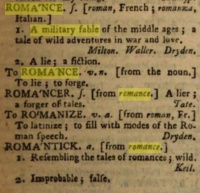Samuel Johnson
From The Art and Popular Culture Encyclopedia

|
"I remember a remark made by Scaliger upon Pontanus, that all his writings are filled with the same images; and that if you take from him his lilies and his roses, his satyrs and his dryads, he will have nothing left that can be called poetry. In like manner almost all the fictions of the last age will vanish, if you deprive them of a hermit and a wood, a battle and a shipwreck." --The Rambler No. 4. Saturday, 31 March 1750 by Samuel Johnson |
|
Related e |
|
Featured: |
Samuel Johnson (1709 – 1784), often called Dr Johnson, was an English writer who made lasting contributions as a poet, playwright, essayist, moralist, critic, biographer, editor and lexicographer. He was a devout Anglican, and a committed Tory. His witty asides are still in print today.
After work as a teacher, he moved to London and began writing for The Gentleman's Magazine. Early works include Life of Mr Richard Savage, the poems London and The Vanity of Human Wishes and the play Irene. After nine years' effort, Johnson's A Dictionary of the English Language appeared in 1755 with far-reaching effects on Modern English, acclaimed as "one of the greatest single achievements of scholarship". Until the arrival of the Oxford English Dictionary 150 years later, Johnson's was pre-eminent. Later work included essays, an annotated The Plays of William Shakespeare and The History of Rasselas, Prince of Abissinia. In 1763 he befriended James Boswell, with whom he travelled to Scotland, as Johnson described in A Journey to the Western Islands of Scotland. Near the end of his life came a massive, influential Lives of the Most Eminent English Poets of 17th and 18th centuries.
Tall and robust, he displayed gestures and tics that disconcerted some on meeting him. Boswell's Life, along with other biographies, documented Johnson's behaviour and mannerisms in such detail that they have informed the posthumous diagnosis of Tourette syndrome, a condition not defined or diagnosed in the 18th century. After several illnesses, he died on the evening of 13 December 1784 and was buried in Westminster Abbey. Thereafter he was increasingly seen to have had a lasting effect on literary criticism and even claimed to be the one truly great critic of English literature.
Major works
| Essays, pamphlets, periodicals, sermons | |
| 1732–33 | Birmingham Journal |
| 1747 | Plan for a Dictionary of the English Language |
| 1750–52 | The Rambler |
| 1753–54 | The Adventurer |
| 1756 | Universal Visiter |
| 1756- | The Literary Magazine, or Universal Review |
| 1758–60 | The Idler (1758–1760) |
| 1770 | The False Alarm |
| 1771 | Thoughts on the Late Transactions Respecting Falkland's Islands |
| 1774 | The Patriot |
| 1775 | A Journey to the Western Islands of Scotland |
| Taxation No Tyranny | |
| 1781 | The Beauties of Johnson |
| Poetry | |
| 1728 | Messiah, a translation into Latin of Alexander Pope's Messiah |
| 1738 | London |
| 1747 | Prologue at the Opening of the Theatre in Drury Lane |
| 1749 | The Vanity of Human Wishes |
| Irene, a Tragedy | |
| Biographies, criticism | |
| 1744 | Life of Mr Richard Savage |
| 1745 | Miscellaneous Observations on the Tragedy of Macbeth |
| 1756 | "Life of Browne" in Thomas Browne's Christian Morals |
| Proposals for Printing, by Subscription, the Dramatick Works of William Shakespeare | |
| 1765 | Preface to the Plays of William Shakespeare |
| The Plays of William Shakespeare | |
| 1779–81 | Lives of the Poets |
| Dictionary | |
| 1755 | Preface to a Dictionary of the English Language |
| A Dictionary of the English Language | |
| Novellas | |
| 1759 | The History of Rasselas, Prince of Abissinia |

